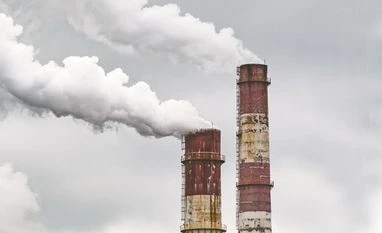India will address the issue of the European Union's plan to impose a carbon tax on certain imported goods, Commerce and Industry Minister Piyush Goyal on Friday said, adding that "I will retaliate" if required.
The CBAM (Carbon Border Adjustment Mechanism) or carbon tax (a kind of import duty) will come into effect from January 1, 2026. However, from October 1 this year, domestic companies from seven carbon-intensive sectors, including steel, cement, fertiliser, aluminium and hydrocarbon products, will have to share data with regard to carbon emissions with the EU.
"Bharat will address the problem of CBAM with confidence, and we will find solutions. We will see how we can convert CBAM to our advantage if it comes in. Of course, I will retaliate. You need not worry about it," Goyal said here at an industry chamber event.
According to a report of the think tank Global Trade Research Initiative (GTRI), CBAM will translate into a 20-35 per cent tax on select imports into the EU, starting January 1, 2026.
India's 26.6 per cent of exports of iron ore pellets, iron, steel, and aluminium products go to the EU. These products would be hit by CBAM. India exported these goods worth USD 7.4 billion in 2023 to the EU.
He also said that India retaliated against the US after it imposed additional customs duties on certain steel and aluminium products.
More From This Section
To resolve the issues, India and the US ended all the bilateral disputes that they had in the World Trade Organisation (WTO).
The minister also asked the industry to help promote the electric vehicle mission of the country to promote sustainable growth.
There is a need to quickly replace the existing public buses and trucks in the country with electric vehicles, besides two and four-wheeler vehicles in a mission mode, he added.
"We have not even started the progress on replacement of old vehicles...Can we have more vehicles scrapping across the country? Can each one of you start demanding that in your company, all vehicles will be electric, all trucks coming into your companies will be electric," he said.
The minister said that using electric vehicles has economic value prepositions.
Citing an example of Mumbai's Brihanmumbai Electric Supply and Transport (BEST), Goyal said it was a perpetually loss-making body, but they are now moving to EV buses.
"Now, in a year or 1.5 years, there will be 100 per cent electric buses and ...(I have been told that) as soon as all the buses go electric, they would end losses and covert it (BEST) into a profit-making body," he said.
He appealed that every state transportation body will become a profit-making body by adopting electric mobility.
On foreign exchange reserves in the country, he said the reserves are enough for the next 5-6 years, "if we continue to have the current levels of current account deficit or trade deficit", without any threat to the Indian economy.
India's forex reserves stood at USD 604 billion as of December 1.
Further, he said that countries like Chile and Peru are looking at trade pacts with India.
)